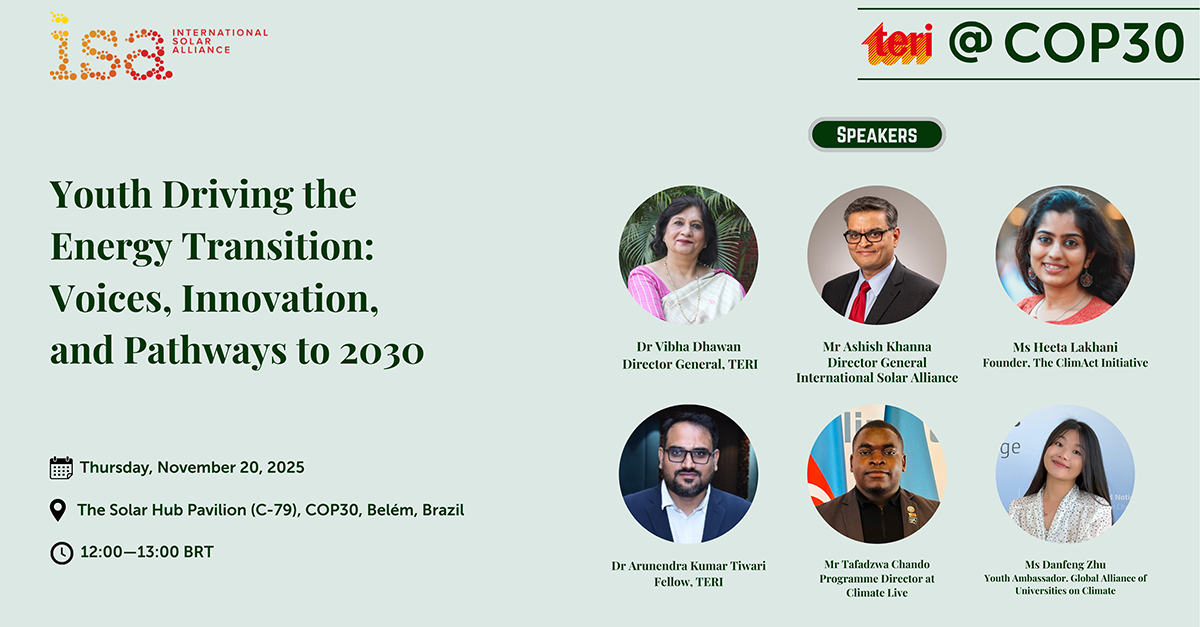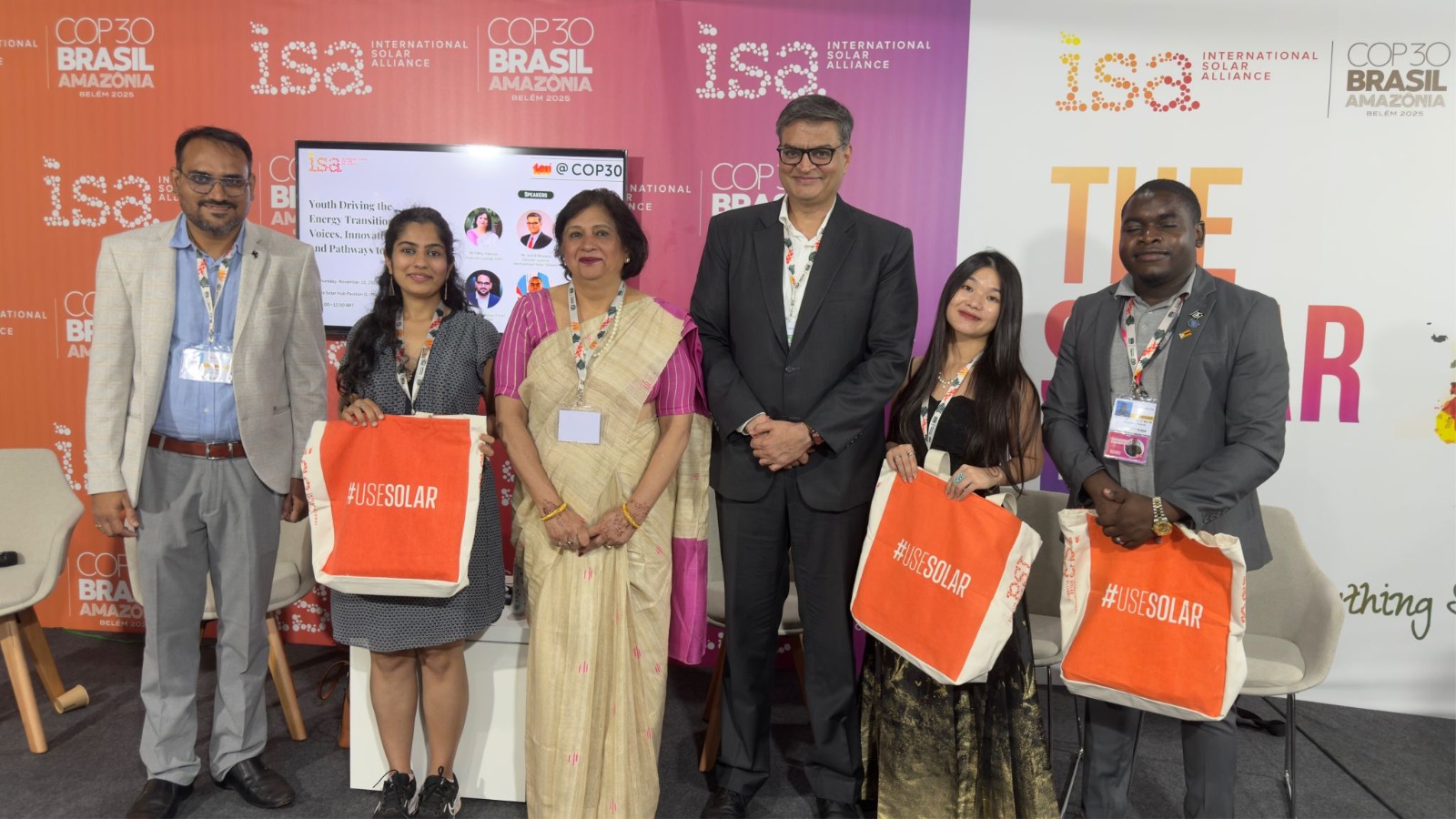Youth Driving the Energy Transition: Voices, Innovation, and Pathways to 2030

As the world advances toward a net-zero future, youth are emerging as a driving force in shaping a sustainable, inclusive, and resilient energy transition. The United Nations reports that the world now has the largest youth population in history — about 1.8 billion people aged 10–24, with nearly 90 per cent residing in developing regions of Asia and Africa. This demographic represents not only the future workforce but also the creativity, innovation, and leadership essential for a low-carbon world.
The clean energy transformation is, therefore, not only a technological shift but a human one — centered on vision, participation, and opportunity. According to IRENA’s 2024 Renewable Energy and Jobs Report, the sector employed around 14 million people globally in 2023, a figure projected to rise to 38 million by 2030 under global transition scenarios. Across the world, young innovators, entrepreneurs, and professionals are emerging as the architects of change, advancing local solutions that collectively accelerate global progress toward sustainable energy and climate goals.
India’s experience provides a powerful example of this transformation. Over the past decade, the country has emerged as a renewable energy powerhouse, demonstrating that economic growth and decarbonisation can go hand in hand. With an installed capacity of over 250 GW of non-fossil fuel in 2025, India is the fourth-largest renewable energy market in the world. The nation has set a visionary target of 500 GW of non-fossil fuel-based capacity by 2030, supported by progressive policies, competitive markets, and technological innovation.
At the heart of this transformation lies India’s leadership in solar energy, both domestically and globally through the International Solar Alliance (ISA). Conceived by India and France at COP21, the ISA now brings together over 110 member countries, promoting solar deployment, capacity building, and South-South cooperation. The Alliance’s work—ranging from solar rooftops and mini-grids to e-mobility and green hydrogen—represents a collective commitment to universal energy access and climate resilience.
As countries globally advances toward its Net Zero goal, youth will play a defining role in shaping the next phase of this transition—what can be termed Energy Transition 2.0—anchored in innovation, digitalization, and decentralized clean energy systems.
The session will explore how young people are influencing and accelerating the global energy transition through innovation, policy advocacy, and entrepreneurship. It will also highlight India’s renewable energy journey and ISA’s pivotal role in uniting the global South around solar-led development.
Key objectives include:
- Showcasing the contribution of youth innovators, researchers, and start-ups in driving clean energy solutions.
- Sharing India’s renewable energy achievements and the policy ecosystem that enables youth engagement.
- Discussing ISA’s initiatives to foster international collaboration and capacity building among young professionals in member countries.
- Identifying opportunities for cross-country learning and mentorship within the Global South.
Discussion Themes
Youth Innovation and Technology:
- Emerging technologies in solar PV, energy storage, and smart grids driven by young entrepreneurs.
- Start-ups and incubation models that are democratizing access to clean energy.
Policy and International Collaboration:
- India’s leadership in RE policy and how similar frameworks can be adapted by ISA member countries.
- Opportunities for youth engagement in policy design and implementation.
Global Partnerships and the Role of ISA:
- ISA’s initiatives promoting solar finance, skill development, and innovation exchange.
- Strengthening South-South collaboration through youth-led research and project incubation.
Expected Outcomes
- A shared understanding of youth priorities and challenges in participating in the clean energy transition.
- Identification of policy measures and collaborative mechanisms to empower youth-led innovation.
- Strengthened partnership between TERI, ISA, and youth networks for joint action in clean energy education, incubation, and policy dialogue.
| Segment | Duration | Lead / Speakers |
|---|---|---|
| Video Message on India’s Leadership in RE Integration | 5 min | |
| Fireside Chat: Youth Driving the Energy Transition | 25 min | Dr Vibha Dhawan, Director General, TERI; Mr Ashish Khanna, Director General, ISA; ETC/IEA; MNRE; Young innovator/RE Innovator |
| Audience Q&A and Reflections | 5 min | Dr Vibha Dhawan, Director General, TERI |
| Key Takeaways & Closing | 5 min | Dr Arunendra Kumar Tiwari, Fellow, TERI |
Conclusion
This TERI–ISA session at COP30 will spotlight youth as the driving force of the global clean energy movement—innovators transforming technology, advocates influencing policy, and entrepreneurs creating inclusive growth. It will also reaffirm India’s commitment, through its renewable energy achievements and leadership in ISA, to sharing knowledge, technology, and inspiration with the world.
Together, the session aims to amplify a simple but powerful message:
The ignited minds of the youth are the most powerful resource on the earth, above the earth, and under the earth. Dr APJ Abdul Kalam.

